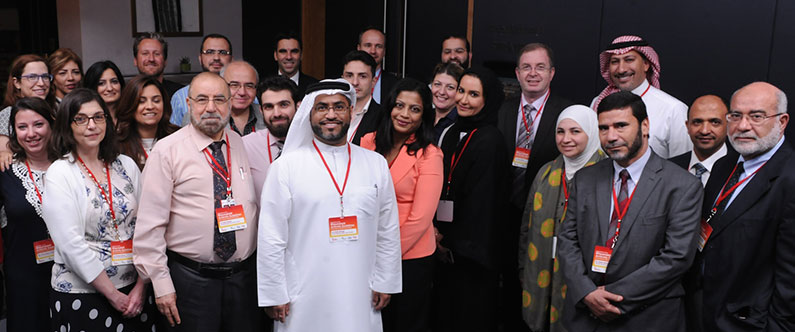WCM-Q brings latest rheumatoid arthritis guidelines to MENA region
 Experts from 10 countries attended the three-day summit.
Experts from 10 countries attended the three-day summit.
Rheumatologists and experts in guideline development from the Middle East, North America and Europe convened at a WCM-Q event to agree on common guidelines for ensuring high quality treatment for patients with rheumatoid arthritis across the Middle East and North Africa (MENA).
WCM-Q coordinated a three-day summit that brought together experts from ten different countries to adapt the recently published American College of Rheumatology (ACR) 2015 Rheumatoid Arthritis guidelines to the MENA region.
The delegates combined their in-depth knowledge of the different healthcare systems and cultures of the region with the most recent evaluation of the available research evidence to decide how best to adapt the ACR Guidelines to ensure patients in the region receive the very best possible care.
Dr. Thurayya Arayssi, associate professor of medicine and associate dean for continuing professional development at WCM-Q, and a practicing rheumatologist, said:
“The medications that are now available to treat rheumatoid arthritis can be extremely effective and often allow patients to live full lives with significantly reduced levels of pain and joint damage. We are very keen to adapt the latest recommendations for our region to ensure patients here receive the full benefit of these modern therapies while taking into consideration their values and preferences.”
The ‘Adaptation of the Rheumatoid Arthritis Guidelines for the Eastern Mediterranean Region’ event was organized by WCM-Q and the AUB GRADE Center and generously funded by Qatar National Research Fund (QNRF), a member of Qatar Foundation and WCM-Q.
In attendance were senior rheumatologists and guideline adaptation experts working in Qatar, the United States, Canada, Lebanon, Egypt, the UAE, Jordan, Oman, Denmark and Saudi Arabia. Many of the delegates who attended are members of the Middle East Rheumatoid Arthritis Consortium (MERAC), a research group based at WCM-Q whose mission is to improve the care of patients with inflammatory rheumatic diseases in the MENA region.
In three days of presentations the delegates, guided by the ACR 2015 Rheumatoid Arthritis guidelines, reviewed scientific studies of patient outcomes and discussed the impact of contextual factors such as the varying cost of medication and the unique characteristics of the different healthcare systems throughout the region.
Dr. Samar Al Razaq Al-Emadi, senior consultant in internal medicine/rheumatology at Hamad Medical Corporation and assistant professor of clinical medicine at WCM-Q, a founding member of MERAC, said:
“We have more and better treatments available for rheumatoid arthritis and to make the best of them for patients we need to tailor these important guidelines according to our local needs in the Arab World.”
Dr. Jasvinder Singh, professor of medicine and epidemiology at the University of Alabama at Birmingham, and chair of the ACR 2015 Rheumatoid Arthritis Guidelines, was in attendance at the event to help with their adaptation for the MENA Region. Dr. Singh said:
“The purpose of developing guidelines is to make available to patients, physicians and policy makers the best possible guidance, determined by reviewing the very best science available and reaching a consensus among leading physician-scientists, practicing physicians, patients and other stakeholders. Adapting these guidelines to local needs is very important to help patients and doctors in the region manage rheumatoid arthritis as effectively as possible.”
Through a series of panel discussions, the delegates reached agreement on the form and content of the adapted ACR Guidelines for the MENA region that will soon be published.
Dr. Elie Akl, professor of medicine at the American University of Beirut (AUB), and director of the AUB GRADE Center described this as a pioneering work in the region. He said:
“We had all ingredients for success: basing the project on internationally recognized guidelines, using a leading guideline adaptation methodology, involving international as well as regional experts, and high-level organization,”
Dr. Arayssi said:
“We are all pleased to have had extremely productive discussions leading to a very strong consensus of the best way to implement the ACR Guidelines for our region.
We feel these measures will be of great value to patients, health care providers and other stakeholders as we work together to ensure treatment of rheumatoid arthritis across the region reaches a consistently high standard. We are very grateful to QNRF, and all of the attendees for making this happen.”